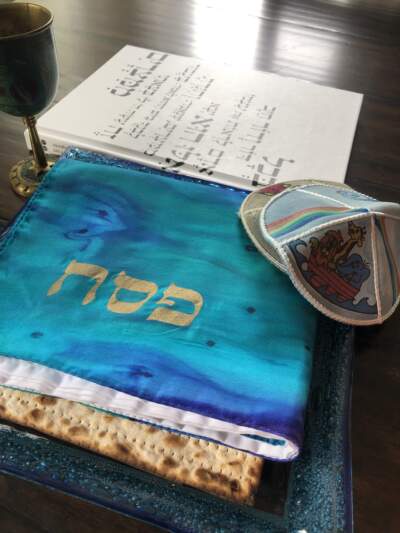There is no unifying story for Passover this year | Cognoscenti
When my grandfather was alive, we rarely saw eye to eye. Our disagreements were too numerous to count, and they’d multiply whenever we were together. No setting was too sacred for us to forego our spats. Even the Passover Seder could become the backdrop to our bickering — the Jewish equivalent of arguing around the Thanksgiving table. But despite our differences of opinion, we always sat together at the same table. There was always room for both of us.

This year, Jews around the world celebrate Passover in a moment of profound trauma and discord brought on by the massacre on October 7th and the ongoing war and humanitarian crisis in Gaza. And there seem to be fewer chairs around our seder tables. Rather than arguing vigorously together, we are retreating from one another. Supporters of the war are retreating from those who oppose it, and vice versa. We no longer sit together.
Matzo, yarmulkes and the author's Haggadah, on his dining room table. (Courtesy Daniel Osborn)Passover has always resonated with me because of its emphasis on peoplehood and values. It’s about an ancient community that was forged through their shared experience of wandering in the wilderness. And it’s about how this community received its laws in the process of wandering, laws that provide a value system that ensures we live justly and righteously.
But this year, this sense of belonging to a unified people has been fractured. And this is resulting in a realization that there is no one definition of justice and righteousness. Instead, we are separating into smaller tribes, each strident in our own belief in the truth of our values.
At the Passover Seder, Jews read the Haggadah, a book that recounts the story of the Exodus of the Israelites from Egypt. In recent decades, it’s become fashionable to adopt different haggadot to suit eclectic sensibilities. There are humanistic, atheistic, pluralistic, feminist, social justice, and a litany of other haggadot to choose from. Yet, importantly, they each tell the same story. The interpretations may change but the basic narrative remains the same. They all recount the burning bush and the 10 plagues. Moses always parts the Red Sea. Whether it’s the Rugrats Passover or “The New American Haggadah,” Jews have always told variations on the same story.
This Passover, six months into a seemingly unrelenting saga of violence, there is no unifying story that we collectively tell about our contemporary situation. Instead, there is widespread divergence in how Jewish people view this catastrophe. The cohesion that Passover has provided Jews for millennia is currently strained in ways I cannot remember and cannot fathom. We are telling different stories and speaking different languages.
At the Passover Seder, the youngest at the table asks four questions, all to learn: How is this night different from all other nights? In recounting the story of the Exodus, these questions are, ultimately, answered by the end of the evening and the account is passed onto the next generation.
Around Passover tables this year, it’s not just the youngest who are asking questions. The pain radiating out from Gaza and Israel, and the anger felt about this conflict around the world, demand that even the elders among us ask entirely new sets of ethical questions. We must ask what it means to be safe, merciful, decent and compassionate. The answers are not so clear cut and they will not be found easily. But there is no option other than to continue asking.
This Passover, six months into a seemingly unrelenting saga of violence, there is no unifying story that we collectively tell about our contemporary situation.
At a Passover Seder, there is a moment when Jews open the door to their homes as a symbolic gesture of openness to those who wander and need sanctuary. We offer our home and our bounty to the stranger. This year, too many doors are closing. They are closing not only to the strangers of the world but to those who once sat at our seder tables. I’ve heard countless stories of friendships between Jews, Muslims and Arabs strained or ended. I’ve also seen intergenerational divisions widen among Jews, as parents and children are driven apart over their stances on the war. As Jews disagree over Israel’s conduct in Gaza, we are becoming strangers to each other.
Traditionally, the Seder ends with the pronouncement, “Next year in Jerusalem!” At times in the long arc of Jewish history, this statement spoke to a deep yearning. At other times, it felt like a promise. For many Jewish people, it was a statement of hope.
“Next year in Jerusalem” rings differently this year. It is more somber. It is somber for people who lost loved ones on October 7th, for whom their anguish drowns out the sentiment’s hope. It is somber for those who are devastated by the continued suffering of Palestinians. It is somber because next year seems so far off, uncertain, and likely full of more violence. We are making this pronouncement with fewer people at our tables and with less goodwill and understanding.
When my grandfather and I argued at our seder table, it was not always pleasant. In fact, it was often painful. But we could argue because we were willing to come together. That too many of us are turning away from sitting together, even if only to argue and disagree is unsustainable. It is its own tragedy in a moment of untold tragedies.
I’ll end my Seder, not with the familiar refrain of “Next year in Jerusalem,” but “Next year, together again.” Otherwise, we’re left wandering.
Follow Cognoscenti on Facebook and Instagram .













































